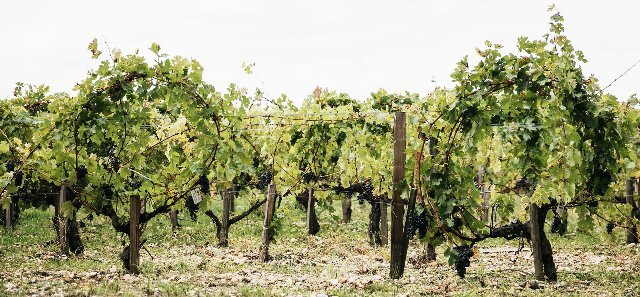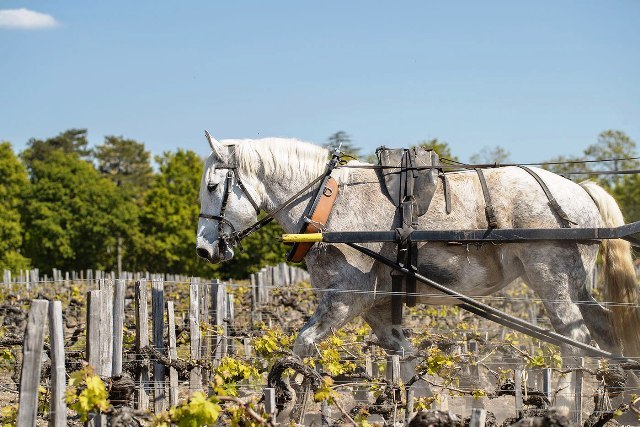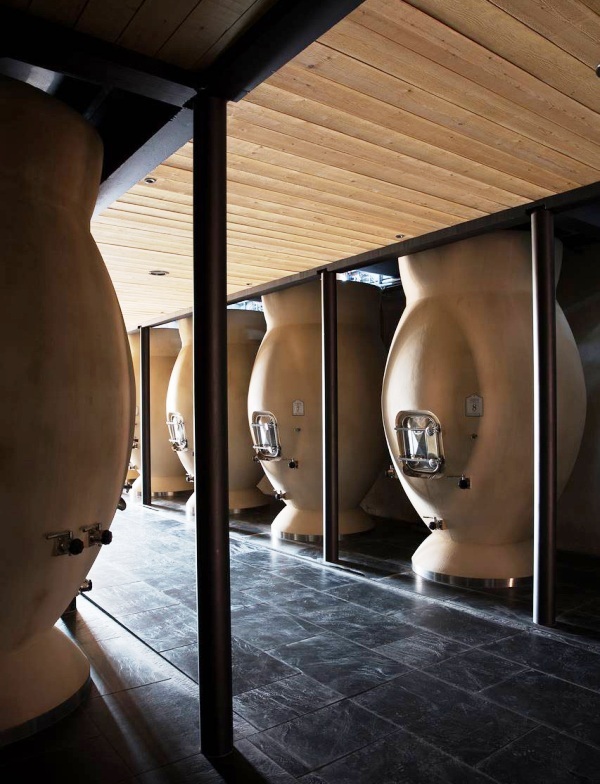organic wine, biodynamic wine, Demeter wine, na... Organic wine estates Château Pontet Canet, Pauillac, Grand Cru Classé
Château Pontet Canet, Pauillac, Grand Cru Classé

Château Pontet Canet is a classic winery in the Pauillac sub-region in the Médoc, which has had the quality rating of 5eme Cru Classé since 1855 and which it did justice to with a short interruption in the middle of the 20th century.
The Château Pontet Canet
This valuable winery with 81 hectares of vineyards in the Pauillac sub-region of the Médoc could be rated slightly higher today given the high quality of its wines. But this has only happened once before, when the neighboring Château Mouton-Rothschild was promoted from Deuxième to Premier Cru in 1973.
The vineyards are planted at a planting density of 9,000 vines/ha with the varieties Cabernet Sauvignon (60%), Merlot (33%), Cabernet Franc (5%) and Petit Verdot (2%). The average age of the vines is 35 years and the planting density is 9,000 vines per hectare.
There is no school of thought or initiation rituals here
In Pontet-Canet, winemaking practices are the result of many years of experience. They are also the result of many trials that include moments of doubt but also great excitement. Gaining subtle knowledge of the living environment requires continuous observation and self-inquiry.
To the north the property has two prestigious neighbors, Mouton and Lafite. The Pontet-Canet vineyard is located in the municipality of Pauillac and it consists of around a hundred plots and 800,000 vines overlooking the Gironde estuary.
At the heart of the Pontet-Canet terroir, known as the “Plateau,” is a gentle, wide rocky outcrop of Günz-era Garonne gravel soil resting on a limestone bedrock. This poor, well-drained soil is known to be particularly suitable for the character of the great Cabernet Sauvignon, a grape variety that makes up over 60% of Pontet Canet's "Grand Vin".

More than 80 years old Cabernet Sauvignon with a special form of cultivation
Some plots at the top of the ledge were planted in the late 1940s. These old vines are very deeply rooted and produce grapes of the highest quality. There are still a lot of these old vines and the average age of the vineyards is 50 years.
The other part of the vineyard is near the river, not far from the village of Pouyalet. This zone is much more calcareous; in some places the limestone can be seen on the surface; in others, sound shines through.
These cooler, richer soils are better suited to Merlot and produce wines with a more structured and fleshy texture. To create a link to the winemaking past, four plots on the edge of the rocky outcrop were planted with the Petit Verdot variety, which imparts spicy aromas. The Petit Verdot variety gives the Grand Cru Classé of Château Pontet Canet the spicy aromas.
Today they are managed according to biodynamic rules. All work on the vines is carried out manually; several horse teams are used for the heavier tasks, especially working on the soil. 95% of the entire workforce's working time is spent on this. Only 5% goes to winemaking and administration.

The recent history of Château Pontet Canet
During the last three centuries the property has been in the hands of 3 families. It was founded by Jean-François de Pontet at the beginning of the 18th century. His descendants bought a piece of land called Canet. This resulted in the Château Pontet Canet.
In 1865 the property passed to Hermann Cruse, a Danish wine merchant, whose heirs failed to make important investments in vineyards and cellars after World War II and to pay close attention to the quality of the wines. The result was a phase of declining wine quality that lasted several years.
It was only in 1975 that Château Pontet Canet was sold to Guy Tesseron, an experienced winemaker from Bordeaux, who passed it on to his son Alfred, who had worked with him for 20 years. Alfred Tesseron must have been a person open to innovations, who tried and experimented, but also invested in the vineyards and cellars, to restore the château's good reputation with good wines, which he succeeded impressively. This was no coincidence and has been the rule ever since.
In 1994, his daughter Justine joined the company and brought new ideas with her. Viticulture should be possible in symbiosis with nature and not against it. Less important, smaller wineries have been practicing organic and biodynamic viticulture in Bordeaux for decades. Why not a Grand Cru Classé producer? Experiments began; the wine world expected failure rather than success. In the meantime, doubts about the success of the biodynamic working method have given way to amazement at the high quality of the Château Pontet wines.
With the aim of improving the quality of Merlot, the first 14 hectares of Pontet-Canet were converted to biodynamic cultivation in 2004. After this successful attempt, it was decided to convert the entire vineyard the following year.
Therefore, a long-term commitment was made that affected every decision made at Pontet-Canet.
A few years later, in 2010, the castle's wines received certification for organic and biodynamic cultivation.
Practices were now introduced that increasingly respected the natural balance in the vineyard. This included foregoing pruning of the vines' canopy in favor of manually intertwining the long shoots - a practice that allows the vines to self-regulate. This meant that there was no longer any need for defoliation or green harvesting, and each vine interpreted the soul of its terroir in its own way.
As part of the constant search for natural solutions to regulate the soils and through consistent respect for the essence of the terroir, a herbal tea room has been created where all biodynamic preparations, infusions, decoctions, plant dusts, sulfur and copper-based mixtures are produced. Yarrow, chamomile, dandelion, willow and rosemary also have exceptional properties that strengthen the vines' defenses in all phases of the vine cycle and in all weathers. By preparing these plants in situ, we achieve greater therapeutic effectiveness and gain time - important factors considering that a very rapid response is essential in biodynamics. In addition, these plants offer another opportunity to promote biodiversity and a circular economy.
Over the years, the knowledge of the winery's terroirs has gained precision, intimacy and substance. This deeper understanding of the different terroirs has in turn led to more precise monitoring of the ripening processes within each plot and micro-plot.
The return to natural and simple working methods is also being practiced in the cellars.
The increasingly artisanal winemaking takes place in three different vat rooms in the castle: the historic wooden vat room “Skawinski” from the 19th century; the concrete tub room “Nicole”, inaugurated in 2005, and the most recent “Amphora”, built in 2017, which is unique and designed without electricity. Based on the 11th century Roman model and built in the golden ratio, the vats are connected to the earth to reduce electromagnetic influences. The concrete was made from fine silica sand from our own vineyards.

Since 2017, the grapes have been sorted and destemmed individually directly above the vats; they then slowly fall under gravity into the fermentation tanks below. This “silent” sorting table was designed by the winery's technical team and is unique in the Médoc.
The aging process is governed by a single philosophy to ensure that the distinct individual characteristics of the grape varieties and terroirs remain unchanged.
Since the grape varieties used do not ripen at the same time, the grape harvest, vinification and maturation of the biodynamic wines are carried out separately according to grape varieties and plots. Only then is the cuvée put together. During this process, each sample from the various individual plots is subjected to a thorough assessment in the tasting glass. The effort to highlight the original purity of the grapes in the wine is tireless.
The maturation of the Château Pontet Canet 5ème Cru Grand Cru Classé
About half of the production matures in new barrels, 10 to 15% in second-fill barrels and, since 2012, 30 to 40% in dolia (concrete amphorae). This new approach to the way the wines are aged shows that Château Pontet Canet produces biodynamic wines, free from questionable artifice. The aging time in the barrel varies between 16 and 18 months depending on the type of wine.
New Château Pontet Canet, Pauillac, 5ème Grand Cru Classé biodynamic, from € 114.60Product no.: 0453115.00 € / bottle(s) *
1 l = 153.33 €
Delivery period 1-3 days |
![Biowein [pur] Hartl - organic wine shipper](/WebRoot/Store7/Shops/87b180e2-5584-4f7d-8168-acd5dfe63e0b/Styles/Sharp[3]/logo.png)




